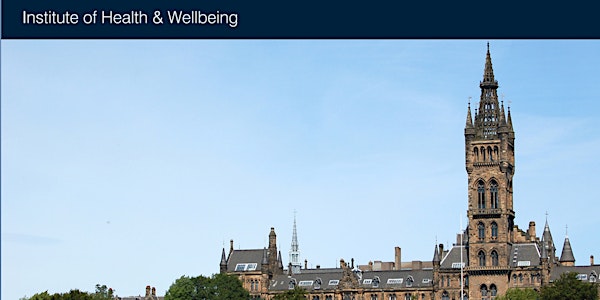
Maurice Bloch Seminar Paul De Pellette Friday 13 May 2016
Date and time
Location
Wolfson Medical School Building, Hugh Fraser
University Avenue G12 8QQ United KingdomDescription
We are pleased to invite you to:
The Institute of Health and Wellbeing Maurice Bloch Annual Lecture Series 2015/16
Title: Getting the most disadvantaged back to work – what works well for whom?
Presenter: Paul de Pellette
Date: Friday 13 May 2016
Time: 1pm, lunch will be served 30mins beforehand
Venue: Hugh Fraser Seminar Room, Wolfson Medical School Building
Chair: Professor Ewan Macdonald OBE
Abstract:
Despite near record levels of people in employment, and a labour market which survived the recession better than most predicted, there remain a stubbornly high number of individuals who are inactive in the labour market across Scotland and the wider UK. The welfare reform landscape of successive governments over the last 20 years has sought to simplify the environment, to provide appropriate activation and support for all, and to incentivise work over benefits, with varying levels of success. In Scotland alone we spend upwards of £500m on employability and skills programmes each year, and to a large extent we do not really know what we get for it, and crucially do not have a consensus on where precious public financials should be steered to achieve the maximum social and economic impact. Using operational insight and extensive data captured by Ingeus on more than half a million clients who have been supported on employability programmes over the last 15 years across the UK, this session will look at:
- What it takes to get those who are most disadvantaged in the labour market activated, engaged and progressing into work.
- What more can be done to build on what works to help ensure that the collective efforts of publicly funded employability services truly help individuals to achieve their potential? How does policy translate to practice?
- Are there credibility gaps between academic consensus and operational reality?
- What are the critical success factors in getting programmes to work effectively? Ultimately this session will seek to answer the £500m pound question - What works well for whom?
Biography
Paul de Pellette is Director for Scotland and Norther Ireland for Ingeus, the largest employability and skills provider in the UK and part of the international Ingeus group of companies which delivers employability services in France, Germany, Switzerland, Poland, Spain, South Korea and Saudi Arabia.
Paul joined Ingeus in 2007, to lead on the establishment of the Pathways to Work programme in Edinburgh, Lothian & Borders – Ingeus’ first service delivery in Scotland. Since then Ingeus has delivered a number of employability programmes including Flexible New Deal, Stairway to Work and the Work Programme, which is delivered in partnership with more than 20 organisations from the voluntary and private sectors. Ingeus has helped more than 45,000 long term unemployed people to move back into work, including over 35,000 Work Programme clients.
Prior to joining Ingeus Paul spent 18 years with Glasgow based social enterprise the Wise Group, initially working in marketing and public affairs before leading on the establishment of employer led programmes and latterly playing a key role in establishing the Wise Group as a nationally recognised provider of large scale back to work programmes.